J. Matsumura
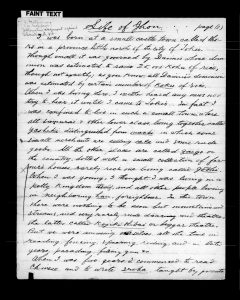
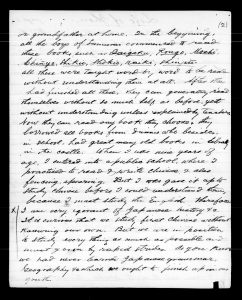
Life of John
(Transcribed by Devin Busono, Izzy Bonvini, Stephen Hu, Stephany Loy, and Jin Sebastian)
I was born at a small castle town called Sho-Ko in a province little north of the city of Tokio. Though small it was governed by Daimio whose dominion was estimated to raise 25,000 koku of rice, though not exactly; as you know, all Daimio’s dominion was estimated by certain number of koku of rice. When I was living there, I neither heard any news nor try to hear it until I came to Tokyo. In fact, I was confined to live in such a small town, where all samurai and other lower class living together called yashiki distinguished from machi in which some small merchants are selling sake and some rude goods. All other places are called zaigo, or the country, dotted with a small collection of farmer’s houses rarely rich one living called goshi. When I was young, I thought I was living in a petty kingdom itself, and all other people living in neighboring han, foreigner.. In this town, there were nothing to be seen but mountains and streams, and very rarely rude dancing and theatre, the latter called kojiki shibai, or “beggar theatre.” But we were amusing ourselves all the time in reading, fencing, spearing, riding, and in later years, parading, firing guns, etc.
When I was five years, I commenced to read Chinese, and to write Iroha, taught by parents or grandfather at home. In the beginning, all the boys of samurai commenced to read these books, such as Daigaku, Rongo, Moshi, Chiuyo, Shikio, Shokio, Raiki, Shunjiuu. All of these were taught word by word to be read without understanding them at all. After they had finished all these, they can generally read themselves without so much help as before, yet without understanding unless explained by teachers. Now they can read any book they choose. They borrowed all books from Daimio, who besides in school, had great many old books in library in the castle. When I was nine years of age, I entered into a public school where I practiced to read and write Chinese and also fencing and spearing. But I gave it up to study Chinese before I could understand them because I must study the English. Therefore, I am very ignorant of Japanese history, etc. It is curious that we study first Chinese without knowing our own. But we are in position to study everything as much as possible and must go on by rapid strides. As you know, we had never learned Japanese grammar, geography, to which we ought to finish up in our youth. But we learned Kumzukushi, the only the one which teaches something like geography, the names of provinces, but we did not know where they are.
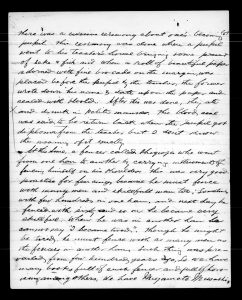
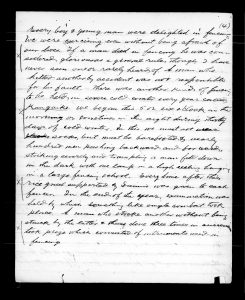
Also, when I was in the same age, I used to practice fencing and spearing evening which were at that time in favorable condition. But soon after spearing became out of use, and only fencing prevailed. Every boy of eight or nine years in samurai class was obliged to exercise fencing in the school. There were a teacher and other subordinate teachers who attended every day and exercised themselves among all the men, and they gave terrible blow upon every boy and man in order to make our muscles and bodies strong. After the time we have finished the exercise every day, the teachers signed our names and marks, which were the number of fencing a man exercised with another. Those who exercised the greatest were considered the best. Besides every day’s exercise, there was the fencing called public fencing six times a month, to be held in the noon and public men attended there, and he marked number of our fencing. Since this was public fencing (as it was called), every man must go to the fencing. Otherwise, he ought get permission from officers attending there
Every boy and young man were delighted in fencing. We were exercising even without being afraid of our lives. If a man died in fencing he was considered glorious as a general rule, though I have never seen one or rarely heard of. A man who killed another by accident was not responsible for his fault. There was another kind of fencing to be held in severe cold winter every year called Kangeiko. We began this 5 or six o’clock in the morning or sometimes in the night during thirty days of cold winter. In this we must not wear socks, but must be barefooted and nearly hundred men pushing backward and forward, striking severely and trampling a man fell down in the dark with one lamp in a high seeling [ceiling?] hanging in a large fencing school. Everytime after this, rice gruel supported by Daimio was given to each fencer. In the end of the year, exammation was held by which something like single combat took place. A man who stroke another without being struck by the latter and thus done three times in succession took prize which consisted of instruments used in fencing.
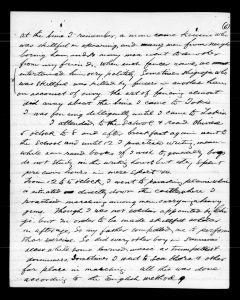
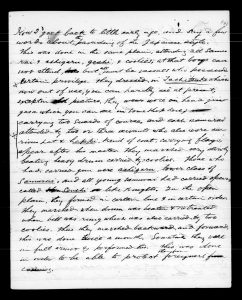
There was a curious ceremony about one’s becoming a pupil. This ceremony was done when a pupil went to his teacher’s house bringing some present of sake and fish and when a roll of beautiful paper adorned with fine brocade on the margin was placed before the pupil and the teacher, the former wrote down his name and date upon the paper and sealed with blood. After this was done, they ate and drank in polite manner. This blood seal was said to be return back when the pupil got diploma from the teacher but I don’t know the meaning of it exactly.
At this time, a fencer called Shigioja who went from one han to another by carrying instruments of fencing himself on his shoulder. This was very good practice for fencing, because he must fence with many men and skillful man too; sometimes with few hundreds in one han, and next day he fenced with sixty and so on he became very skillful. When he was in another han he cannot say “I became tired”. Though he might be tired, he must fence with as many men as the fencers in another han. Such thing was prevailed from few hundred years ago, so we have many books full of such fencer and full of [__p. 5 last two lines] among others. We have Miyamoto Musashi at the time. I remember a man came Kiusiu who was skillful in spearing and many men from neighboring han and so many men went to another from my friends. When such fencer came, we entertained him very politely. Sometimes Shigioja who was skillful was killed by fencers in another han on account of envy. The art of fencing almost died away about the time I came to Tokio. I was fencing dilligently until I came to Tokio.
I attended to the school and read Chinese 5 o’clock to 8 and after breakfast again went to the school and until 12 I practiced writing, meanwhile can read books of I wish to; generally boys do not study in the writing hours but they spent precious hours in mere sport etc. From 12 to 5 o’clock, I went to parading plain which is situated directly down the castle, where I practiced marching among men, carrying a heavy gun. Though I was not soldier appointed by Chiji, but in order to be made skillful soldier in after age, so my father compelled me to perform that exercise. So did every other boy in Samurai class, while some learned music as trumpeters and drummers. Sometimes I went to sea shore and other far place in marching. All this was done according to the English method.
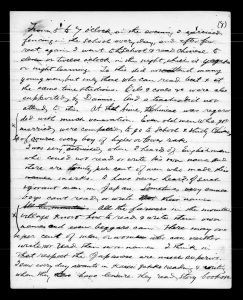
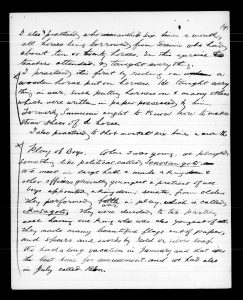
Now I go back to little early age, and say a few words about the parading of the Japanese style. This was done in the same plain, attending all Samurai and ashigaru, goshi, and coolies; at that boys can not attend, but all must be vassals who possessed certain privilege. They dressed in Tachitsuke which now out of use, you can hardly see at present, except in old picture. They wore on head jingasa which you can see in some shop here; carrying two swords of course, and each samurai attended by two or three servants who also wore curious hat and happi, kind of coat, carrying flags, spear after his master. They marched very slowly beating heavy drum carried by coolies. Those who had carried gun were ashigaru, lower class of Samurai, and all young samurai had carried spears called Senshi, like Knights. In the open plain, they formed in certain line and in certain order. They marched when drum was beaten and retreated when bell was rung which was also carried by two coolies. Thus they marched backward and forward. This was done twice a month. Sometime they were in full armor and performed this. This was done in order to be able to protect them from foreigners from coming.
From 5 to 7 o’clock in the evening I exercised fencing in the school every day, and after few rest, again I went to the school and read Chinese and eleven or twelve o’clock in the night, which is yagaku or night learning. To this did not attend many young men, but only those who can read best and at the same time studious. Oils and coals were also supported by Damio, and a teacher did not attend this. At that time, the Chinese was regarded with much veneration. Even old men who got married were compelled to go to school and study Chinese, so of course every boy of higher or lower rank.
I was very much astonished when I heard of Englishmen who could not read or write his own name and there are twenty percent of men who made their marks. I have never heard of such ignorant man in Japan. Sometimes very small boys can’t read or write their names. All the farmers in the mountain village know how to read and write their own names and even beggars can. There may one be percent of men or women who can neither write nor read their own names. I think in that respect the Japanese are much superior. I saw every day servants in Kaisei Gakko reading and writing when they have leisure. They read story books. I also practiced a horsemanship six times a month, all horses being borrowed from Daimio who had about ten or twenty horses. In this exercises teachers attended and taught everything. I practiced this first by riding on a wooden horse put on harness. He taught everything in war, such putting harness on and many others which were written in paper possessed by him. Formerly Samurai ought to know how to make straw shoes of a horse. I also practiced to shot musket six times a month.
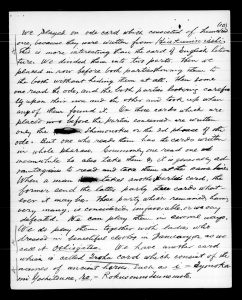
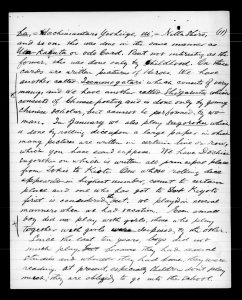
Play of boys. When I was young, we played something like political called Tonosangoto. We meet in large hall and made a king and other officers generally youngest and pretiest of all boys appointed a kingdom; senate, from older. They performed war in play, which is called ikusagato. They were divided to two parties, each having one King who was also youngest of all. They made many beautiful flags out of paper, and spears and swords by gold or silver leaf. We had a long vacation in January and that was the best time for amusement and we had also in July called Bon.
We played on ode card which consisted of hundred one, because they were written from Hiakunin issue. This is more interesting than the card of English literature. We divided them into two parts. Then we placed in row before both parties showing them to the both without hiding them at all. Then some one read the ode, and the both parties looking carefully upon their own and the other and took up when any of them found it. On those cards which are placed before the parties concerned are written only the Shimonoku or the 2nd phrase of the ode. But one who reads them has the cards written in whole pharase. Commonly one read one meanwhile he also take them & it is generally advantageous to read and take them at the same time. When a man takes another party’s card, the former send the latter party these cards whatever it may be. Those party which remained having very many, is considered unfavorable, or we say defeated. We can play them in several ways. We do play them together with ladies who dressed in beautiful clothes in January, or, as we call it Oshiogatsu. We have another card which is caled Iroha card which consist of the names of ancient heroes such as i = Iyonokami Yoshitsune, ro = Rokusonno Tsunemoto, ha = Hachimantaro Yoshiiye, ni = Nitta Shiro, and so on. This was done in the same manner as Uta-karuta or ode card. But not interesting as the former, this was done only by childhood. On these cards are written pictures of Heroes. We have another called Isemonogatari, which consists of very many, and we have another called shigaruta which consists of Chinese poetry and is done only by young Chinese scholar, but cannot be performed by woman. In January we also play sugoroku which is done by rolling dice upon a large paper in which many pictures are written in certain line or row, which you have seen & suppose. We have Dochiu Sugoroku on which is written all principal places from Tokio to Kioto. One whose rolling dice appeared in highest number, count to certain place and one who has got to Kiyoto first is considered the best. We played in several manners when we had vacation. Even small boy did not play with girls, those who play together with girls were despised by the other. Since the last ten years, boys did not much play, because they had several studies and whenever they had time, they were reading. At present, especially children don’t play much; they are obliged to go into the school.
Samurai clans generally don’t care for religion either for Shinto or Budha, but more or less they worship Budha, and they cannot distinguish Shinto from Budha, unless a man who attained highest learning of Japanese. Even one who regards the doctorine of Confucius worships Budha. Old ladies and women in samurai class worship very much; they worship everything which has some form of mankind put in temple, or things of wonder. Such as idol, sun, moon, stars. The master of a family bows down before Hotoke, or representative of dead persons placed in some box and offers it some tea every morning. I think Christianity is the best and true religion in the world and it is very good for those who believe it. Most of the scholars despise whenever I study upon Bible and go to Church. But hope maketh not ashamed; because the love of God is shed abroad in our hearts by the Holy Ghost which is given unto us. Many country people think that Christianity is magic arts, hence we have the word derived from it, Kirishitan, as for example when a man sees something in curious contrivance or trick, he says it is Kirishitan, which is certainly from Christian.
They say that it is not necessary to make country civilized by Christianity, because we have many instances in History, among others Egypt, Greece, Rome and surpassed in some respects that of modern yet they were not Christian. Egyptians were eminent in arts and sciences; Greeks were more eminent in making statues, literature, natural history, architecture, and some of which are the basis of the modern European civilization. Look at Roman law which when is taken as the bases of the modern European jurisprudence, yet they were not Christians. On the contrary, as the Christianity was introduced into it, they became finally all crushed down. Among the moderns, the Sandwich Island, though it may be regarded by Europeans and Americans with the highest honor, since the Christianity introduced there, the people lost their purely national good character, and became very wicked and cunning.
Before the Christianity was introduced, they had some good manners and customs though they were savages. So they never believe. All the missionaries who came from abroad in order to convert our people with kindness, the country people say; they came to our country to get money and so do teachers. And at the same time, Christianity does not make people’s characters good, they say. The bars in our country are more superior in morals than Christians who came here and learned good customs from Japanese. There is no in Japan such ignorant people as the English who made their marks. Doctrine of Confucious in some respects resembles that of Christian and at the same time surpasses the latter. Supposing that by and by Christianity is introduced into our country, there would probably be insurrections or civil wars arisen and killed many men, which shows the Christianity very bad, and as did in Europe. These are the words which country people say.
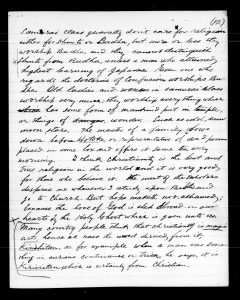
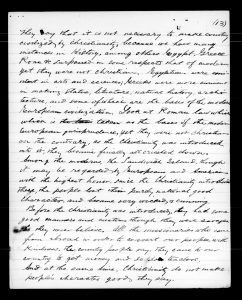
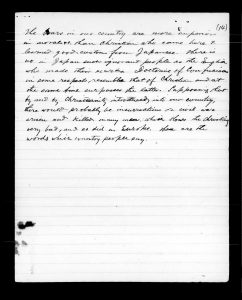
-
-
Throughout his essay, Matsumura describes the effect that Western influence has had on his childhood and his daily life. He tells of the hustle and bustle of his daily routine, which starts with reading Chinese at 5 AM and covers everything from going to school, to practicing marching with other men, to fencing drills, to wrapping up his day by going to a night school (yagaku) to study Chinese again until 12 AM. Though this busy life of his did not allot much sleeping or resting time, it seemingly has a healthy balance of academics and extracurriculars, reflective of how the image of a samurai was now that of a martial and literary mastery. Japanese studies, however, had to be sacrificed as a result, since the need to learn English superseded many other disciplines. This left Matsumura and many other Japanese students “very ignorant of Japanese history.” In fact, these students had not even learned Japanese grammar or the locations of Japanese provinces. So why was it that English and even Chinese studies were prioritized over Japanese ones?
The emphasis on Western learning was a result of the imposition of Western culture and education on the Japanese, which brought pressure on the new Meiji government to reform its education system. The extent to which his education was impacted by Westerners is recalled by Matsumura, who writes, “All this was done according to the English method.” Ironically, this “method” resulted in many Japanese becoming better educated than Westerners, as Matsumura remarks how he “was very much astonished when he heard of Englishmen who could not read or write his name,” especially during a time when even Japanese farmers, servants, and beggars were literate, partially in thanks to the policy of widespread education laid down in the Five Charter Oath.
This “method” also included Christianity, which was finally legalized in Japan in 1873. During a period where Christianity was extremely unpopular, Matsumura’s strong devotion to it testifies to the deep impact of Westernization in the lives of Japanese people. Though he admits that Christianity cannot make an evil man good and that even the most civilized people did not believe in it, Matsumura believes that “Christianity is the best and truest religion in the world,” and that those who think that Christianity will introduce war and insurrection are but “country people.” Ultimately, through his religious nonconformity, his education, and his daily routine, Matsumura shares a Japanese student’s perspective on the significance of Westernization under the tutelage of William Griffis.
-
John Matsumura’s essay about his life provides an enticing insight to the things Japanese students learned and observed on a daily basis. The writing itself paints an extremely detailed picture of a culturally rich upbringing and complex studies in a variety of fields. In typical Japanese fashion, the author rarely speaks about his emotions or personal experiences in the piece, but he makes up for it with thorough explanations and descriptions. Matsumura describes being brought up in a province governed by Daimyo, and how his life was almost constantly saturated with other cultures. At five years old he began writing in Chinese, and was soon thereafter reading books written completely in the Chinese language, learning through trial and error and the assistance of teachers. He explains that students were taught about Japan, but on a very surface-level basis, and couldn’t necessarily even place all of the Japanese provinces on a map. Regardless, his childhood was much like anyone else’s. Matsumura and his friends would play games of kingdoms and cards, and he was very interested in fencing. In fact, fencing was a topic very heavily explored throughout his essay. A highly revered and dangerous hobby, fencing was a common pastime and a great way for people to come together for entertainment and exercise. Generally speaking, when Matsumura refers to his education, he discusses a wide variety of classes and specializations, including military experience. He also comments about the superior intellect of the Japanese people when he criticizes Englishmen for not being able to write their own names. Matsumura’s essay concludes with a reflection on religion, and how he finds Christianity to be the best one, and by far the most beneficial to society and social progress.
This essay is important for us to study because it shows how much traditional Japanese life and Western life have merged and integrated into the lives of Japanese students. Matsumura’s essay is filled with what can essentially be read as praise and criticism of both Japan and the West. His homeland’s emphasis on Chinese education at an early age took away from what could have been learned about Japan itself, but it also produced generally smarter people; Englishmen are essentially illiterate, but Western religion is superior and he subscribes to the teachings of Christianity. “Life of John” is a perfect firsthand depiction of a life that teetered on the edge of traditional and modern.
-
Matsumura’s autobiography reveals his conventional upper-class samurai upbringing, while also displaying the unique position he was placed in after his contact with Griffis and the Western world. We know that although he’s proud of his culture and his upbringing, he’s also quite converted to the Western style of things. For instance, he commends Japan’s high literacy rates, but also concludes that positive statement by saying “in that respect,” implying that it was merely one aspect of Japanese society that was superior. A convert to Christianity, Matsumura considers it to be the one true religion, while also musing on the thoughts of the Japanese people he knows with their doubts of the power of Christianity.
However, most of his autobiography consists of reminising about his very Japanese upbringing. Asked to read Japanese and Chinese classics and even playing karuta, a game which involves knowing Japanese history and/or poetry, Matsumara was clearly educated in the classics, and still remains thoughtful and respectful of his upbringing while also respecting his newfound belief in the power of Western Christianity, representing his overall balance between his two belief systems.
-
One thing that I noticed about the essay was that it was a lot more personal in terms of the student writing about his own experiences. It had a lot more uses of “I” and a lot more of Matsumura’s own experiences than I’ve seen in previous writings. However, similar to the essays we’ve read before, it still lacked a lot of the personal feelings and reactions that he would have experienced. A large portion of the autobiography is pure explanation of what Matsumura remembers and stories such as the stories he recalls of other talented fencers. I found it especially interesting that the essay is called “Life of John” yet doesn’t go through the personal events that someone would usually write in their autobiography. In a usual autobiography, someone would go through their life starting from birth and include all the details that they remember from infancy, childhood, adolescence, and adulthood or whatever stage of life they are currently in. However, the autobiography is mostly focused on the everyday life and activities that Matsumura enjoyed, like going to school, reading, fencing and marching. Matsumura doesn’t go through his life but rather talks quickly about his birth and the town he grew up and then goes right to age 5 years. The essay lacks the ages that the events and memories he is remembering occur at and truthfully make it confusing to read and understand. The essay also lacks personal touches like family members, friends, and other people they would have relationships with. He mentions people but doesn’t go into whether he knew them personally or if he had just heard about them in a story told by other people. Another interesting thing that I noted while reading through the essay was that it lacked a linear narrative, rather jumping from topics and rarely including ages or a sense of time. In one section, he goes from talking about fencing to the process of becoming a pupil and then back to fencing. This jumping and lack of chronological order makes me think that Matsumura was writing as he thought rather than planning out and I wonder if this is a common pattern in the other essays.
-
This autobiography is interesting as it truly goes into detail about Matsumura’s routine throughout his life and does not include much else regarding his personal emotions, which is typical of Japanese writing and documentation at the time. For example, as seen in the journals of the Iwakura mission, many paid specific attention to how a room was structured or how American government officials acted in terms of manners when first meeting. In Matsumura’s biography’s case, there are brief moments of his own opinion on a matter, especially towards the second half regarding foreigners and Christianity, however for the most part, Matsumura just lists his activities and describes in great detail about what they are and their significance in his life. Matsumura dedicates a few pages just to describing fencing, which undeniably was important to him as a child but he ends up just detailing the class, from its times to its rituals and ceremonies, and even stories of other fencers. Yet, unlike modern biographies, Matsumura himself does not add stories regarding himself, whether it be his trials, successes, failures or what made fencing so important to him to the point that he would continue fencing until he went to Tokyo. Though from a historical perspective, Matsumura’s biography is still very useful when looking at the amount of he detail he puts. From the beginning, the reader learns a lot about Matsumura’s home town of Sho-Ko regarding the structure of the town and even the size based off koku of rice. Then, by also describing his studies in great detail, he gives an idea of the education during his youth, which although definitely is not representative of the education of most of Japan’s youth, is general enough to be applied to most Japanese samurai youth. Even when expressing his surprise at the illiteracy of Englishmen, he gives his own estimate of the literacy rate of Japan, though it is likely that it is a pure guess. Notably, towards the end of the passage, Matsumura gives his full support to Christianity, something most Japanese would never dare to convert to. While this may show a shift in Japanese ways of thinking, I think his conversion is more reflective of his own personality, considering he is learning under Griffis and seems very learned about Western culture and history, with his numerous references to other civilizations.